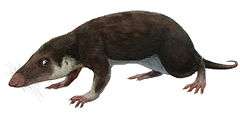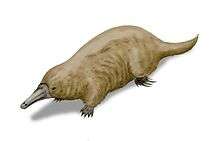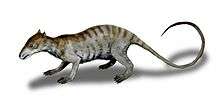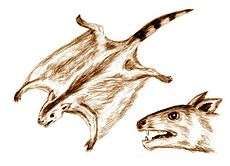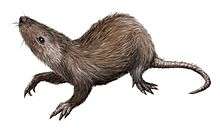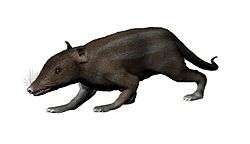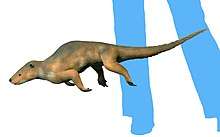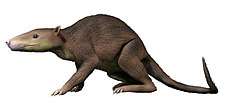Pharsophorus
Pharsophorus is an extinct genus of borhyaenoid sparassodont that inhabited South America during the Middle to Late Oligocene epoch.[1]
| Pharsophorus | |
|---|---|
| Scientific classification | |
| Kingdom: | |
| Phylum: | |
| Class: | |
| Order: | |
| Superfamily: | †Borhyaenoidea |
| Genus: | †Pharsophorus Ameghino 1897 |
| Species | |
| |
| Synonyms | |
| |
Taxonomy
Originally, Pharsophorus was thought to be a borhyaenid, and was even considered to be the direct ancestor of Borhyaena, Acrocyon, and Arctodictis, but later phylogenetic analyses have shown that it is not a member of the Borhyaenidae and is only more distantly related to these forms.[2][3] Remains of Pharsophorus are known from the Sarmiento Formation of the provinces of Mendoza, Santa Cruz, and Chubut in Argentina, as well as the Salla Formation at the fossil site of Salla in western Bolivia.[4][5] The species "Pharsophorus" antiquus, formerly assigned to this genus, was eventually made the type species of a separate genus Australohyaena.[6]
References
- Pharsophorus at Fossilworks.org
- Marshall, Larry G. (1978). Evolution of the Borhyaenidae, extinct South American predaceous marsupials. 117. University of California Press. pp. 1–89. ISBN 9780520095717.
- Forasiepi, Analía M. (2009). "Osteology of Arctodictis sinclairi (Mammalia, Metatheria, Sparassodonta) and phylogeny of Cenozoic metatherian carnivores from South America". Monografías del Museo Argentino de Ciencias Naturales. 6: 1–174.
- Patterson, Bryan; Larry G. Marshall (1978). "The Deseadan, Early Oligocene, Marsupialia South America". Fieldiana: Geology. 41 (2): 37–100.
- Cerdeño, Bryan (2012). "Quebrada Fiera (Mendoza), un importante centro paleobiogeográfico en el Oligoceno tardío de América del Sur". Estudios Geológicos. 67 (2): 375–385. doi:10.3989/egeol.40519.194.
- Analía M. Forasiepi, M. Judith Babot and Natalia Zimicz (2014). "Australohyaena antiqua (Mammalia, Metatheria, Sparassodonta), a large predator from the Late Oligocene of Patagonia". Journal of Systematic Palaeontology. 13 (6): 503–525. doi:10.1080/14772019.2014.926403. S2CID 83669335.
